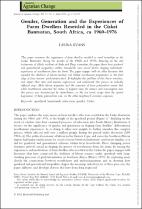Gender, generation and the experiences of farm dwellers resettled in the Ciskei Bantustan, South Africa, ca 1960–1976
Abstract
This paper examines the experiences of farm dwellers resettled in rural townships in theCiskei Bantustan during the decades of the 1960s and 1970s. Drawing on the oraltestimonies of elderly residents of Sada and Ilinge townships, the paper shows how genderedand generational inequalities within households were crucial factors shaping individuals’experiences of resettlement from the farms. The paper engages with an older literature thatregarded the abolition of labour tenancy and linked resettlement programmes as the finalstage of farm tenants’ proletarianization. It highlights the problems of this linear narrative,and argues that men and women experienced and understood this process in radicallydifferent ways. Male labour migration and the remnants of farm paternalism meant thatwhile resettlement cemented the status of migrant men, for women and non-migrant menthis process was characterized by contradiction: on the one hand, escape from the spatialhegemonies of farm paternalism and, on the other, heightened economic exposure.

